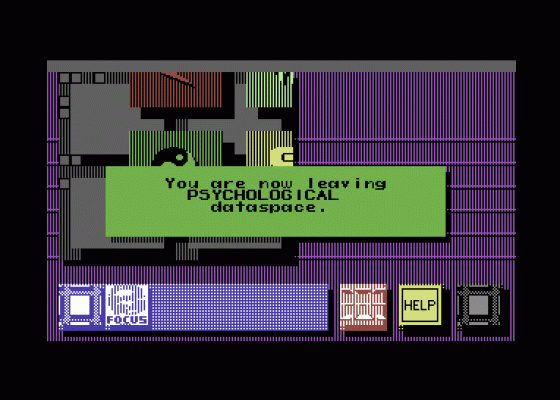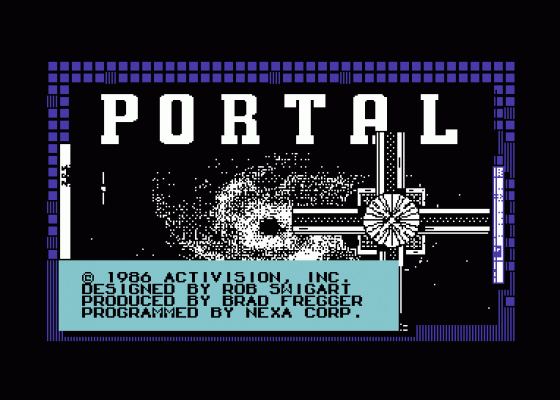
Commodore User
 1st February 1987
1st February 1987
Categories: Review: Software
Author: Bohdan Buciak
Publisher: Activision
Machine: Commodore 64
Published in Commodore User #42
Portal
Returning after a gruelling 100-year mission to 61 Cygni, you discover that the Earth is not as you left it. Travelling across the unusually green and forested globe in your Gyges ship, you search vainly for races of the civilisation you left behind so long ago, not to mention somewhere to have a long overdue bath.
To cut a long story short (and long is too short a word for it) you realise you are the last human being left on Earth, a fate not unlike spending Sunday afternoon in Milton Keynes. Thankful you are not afflicted with the latter, you travel to Chicago and find a live computer terminal. By its side you notice a world map and a set of instructions for operating the terminal.
Actually, you won't have to go to Chicago, you will find yours in the box. You will also find three disks filled with no less than five sides of data. Because Portal is no mere game, it's no adventure, it's a complete sci-fi novel on disk.

The challenge of Portal is that you must fathom out the mystery of this vanished civilisation or face an eternity of total solitude, or as long as it takes to get over wasting £19.99.
Anyway, back to the terminal. It gives you access to the twelve dataspaces in the world network. By continually interrogating them, you gradually put together the pieces of what amounts to a gigantic jigsaw. That's it really. There seem to be no puzzles to solve, no zapping or combat sequences, no taxing cryptic clues and no way for you to get involved in the action.
You just sit there and slog it out, a steady stream of information providing the driving force to continue. You know that, if you stick at it, all will eventually revealed.

You will meet loads of characters but the most important one is Peter Devore, around whom the whole caboodle revolves. He's a bright 15-year old who accidentally stumbles into a dataspace he shouldn't have been reading. Consequently, he discovers the Portal, the energy vortex that allows Migration to the Realm. No evenings outside the chippie for Peter, he's into hypnogogic sync.
Trouble is, the cops (in the shape of Regent Sable) know about his unwholesome activities and are out to get him before he can get to Antarctica and to a certain Dittmore Seminole Gadd (Mentor to his friends) who will help Peter to do I don't know what - and even if I did, I wouldn't tell you.
A few more interesting characters have been thrown up so far (I'm just finishing the second side). There is Peter's gran Astora Moray, who's referred to as "it" because she's had a unisex operation.

Then there's Wanda Sixlove, who looks set to provide some romantic diversions. Get this: "yet she was beautiful, white of skin and pale gold of hair". She's already been doing hypnogogic things with Peter - quite an achievement since she's in deep freeze on a spaceship to Vega [Steamy! - Ed].
And let's not forget Jimmy Radix, a 55-year-old veteran of the Burma War. He got zapped by neurophage weapons and thinks he's still 23. His disease is forgetfulness but there's plenty more genetic diseases knocking around just waiting to be caught. Jimmy's forgetfulness is fortunate because the cops have caught him. He won't snitch - he can't.
All this info is gathered simply by using the joystick to plough your way through menus and icons. The twelve dataspaces appear as a 3 x 4 matrix of squares. Having chosen a dataspace, it lists a set of files you can open and read. Files are marked when you've read them but you can go back and browse through any file you like. Also, your position can be saved at any stage so you can easily resume where you left off.

Some dataspaces don't always allow immediate access and list only files that are appropriate to your position in the game. The whole thing is relative, you can't carry on until you have read the necessary files.
The most important dataspace is Homer. Homer is a raconteur algorithm, a storytelling computer to you, that helps and guides you through the dataspaces. It pieces together new files for you, gets you into restricted areas and gives frequent helpful messages - if you ask it. But sometimes, it's just cryptic and profound. So when you are really stuck, messages like, "The golden thread binds all consciousness" make you want to rip its batteries out.
A game that relies so heavily on text and involves you in so little action has no right to be interesting. But Portal dishes up some pretty gripping stuff. Like all good sci-fi books, it tries to build a complete world and sprinkles it with the necessary jargon. It's crammed full of words that could only appear in Captain Kirk's log, and it makes a decent stab at trying to be literature.

Each dataspace contains specialised information. For example, History will give short potted histories of certain periods. Military gives info on wars and weapons and Sci-Tech deals with anything scientific.
To counter the boredom induced by reading too much text, the authors have thrown in three databases that give information on each of the characters in a graphic form. Stuff like physical, psychological and emotional statistics. This is confusing at first because you think it's all essential to your progress. It's not, and is probably only there to provide some graphic relief.
I've spent two long days on Portal now. I reckon I'm about a third of the way there and I've still got only a vague idea of what's going on. What keeps me going on is Homer's knack of coming up with some really meaty stuff just as I was ready to chuck it in. Come on Homer, tell me whether Peter's going to make it with Wanda.
Portal is not only an impressive piece of programming, it's shaping up to be a reasonably good sci-fi yarn too. And it is surprisingly good value for money, considering you get no less than three disks. Dip into it a couple of nights a week and you'll still be sat there when the daffodils bloom.













